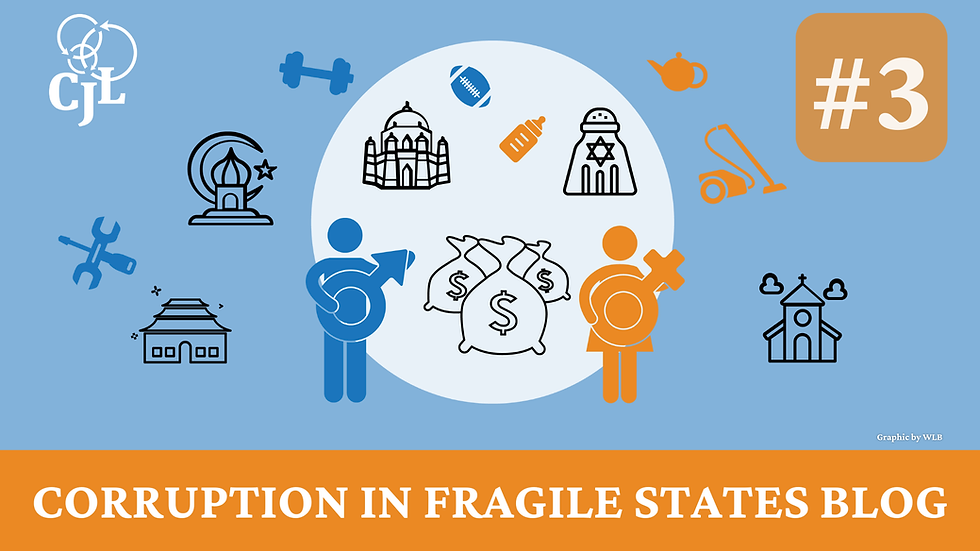Friends with Benefits: Corruption in Fragile State’s Best of 2022
- Alex Ralph, CJL

- Jan 6, 2023
- 4 min read
By Alex Ralph, Editor, Corruption in Fragile States Blog

All right, a photo of a puppy is perhaps the lowest form of clickbait. Diligent readers of our blog, however, will recognize this punch-drunk pooch from last year’s Best of 2021 post. Why has she returned for our Best of 2022? Well, my personal highlight this year was teaching Francie to read. And read Francie has, devouring (literally and literarily) countless CJL blog posts plus great works of world literature.
A commonplace of “Best of the Year” pieces is to reference various highs and lows of the past 365 days. Here, I will instead confine myself to some of what preoccupied us at the blog in 2022.
Naturally, Ukraine was much on our collective minds. We published four posts directly related to Russia’s invasion (including one by Global Witness’ Patrick Alley); these posts focused on the role corruption has played in the conflict and how anti-corruption efforts have contributed to the Ukrainian resistance. A continent to the east, the first anniversary of the American withdrawal from Afghanistan prompted U4’s Arne Strand to grapple with key anti-corruption lessons from these long twenty years.
Away from the battlefield, CJL authors have continued to flesh out the nuances of social norms programming, both in the blog and in our Short Guides for Practitioners. New for us this year at the blog, we published interviews with Transparency International co-founder Frank Vogl and CJL’s co-founder Cheyanne Scharbatke-Church. And, happily, the number of you, our readers, continues to grow.
Below, however, is the main event: five of our best-read and favorite posts for 2022. Hope you enjoy.
1. Oksana Huss and Joseph Pozsgai-Alvarez, “Strategic Corruption as a Threat to Security and the New Agenda for Anti-Corruption”
Writing weeks after Russia’s invasion of Ukraine, Huss and Pozsgai-Alvarez argue forcefully that for “too long we have conceptualized anti-corruption practices as an issue in developing countries and restricted our corruption evaluations to within national borders.” Instead, the authors call for us to focus our anti-corruption efforts “on the transnational networks that enable [corruption], most of which are rooted in high-income countries as much as in the developing world.” We must, Huss and Pozsgai-Alvarez write, understand that “anti-corruption is indivisible from human security and human rights; to miss the first is to surrender the latter two.”
CJL’s Jared Miller writes that for most citizens living in countries of endemic corruption, “corruption isn’t just about the politician’s yacht in the Mediterranean—it’s about the impact on their daily life. It’s the extra mile someone walked to get water because the money for their community’s borehole was embezzled. It’s the bribe they had to pay to get through the security checkpoint on the way to the market.” To better understand how social norms affect civil servant corruption, CJL and Miller conducted a lit review and then convened twenty researchers and practitioners to evaluate these findings. The post offers six takeaways on approaches that do and don’t work.
3. Ella Hawkins, “Collective Action, Corruption, and Social Norms: A Roadmap”
Though there’s broad agreement in the anti-corruption community on the importance of collective action to combat endemic corruption, CJL’s Ella Hawkins notes that we have little consensus on the best ways to apply collective action to the field. Hawkins’ post undertakes a deep dive into defining key concepts, how practitioners might use collective action, and which case studies to read. Our author calls for the anti-corruption profession to deploy collective action so as “to disrupt complex systems where corruption prevails.”
4. Michael Johnston, “Zero Tolerance for Zero Tolerance”
One of our first posts of 2022 remained a favorite with readers. In Michael Johnston’s provocation, he highlights both the folly of zero tolerance anti-corruption programs and the actual harm they can produce. His solution is to champion what he calls halfway situations: modest but tangible anti-corruption progress that co-exists with ongoing corruption. “For reform to be sustained and to have a chance to succeed,” Johnston writes, “citizens, activists, leaders, and international partners must resist the temptation to seek immediate once-and-for-all solutions, and instead will all have to prepare for a lengthy struggle—one that may involve major reverses and aim at results for which it may be difficult to claim credit. That approach, however, may be the best way to link corruption control to citizens’ lasting interests in justice and a better quality of life.”
5. Lara Olson and Cheyanne Scharbatke-Church, “Hasty Marriage or Open-Ended Courtship: What do Anti-Corruption & Peacebuilding Communities Need?”
Two old friends go for a walk along a river. There, they discuss the virtues of dating versus marriage. Specifically, how and whether the anti-corruption and peacebuilding fields should join into a marital union or remain friends with benefits. Through these discussions along the confluence of Calgary’s Bow and Elbow rivers, Olson and Scharbatke-Church offer field-specific takes that could be smuggled into an Eric Rohmer film. The authors pose essential questions for what peacebuilders and anti-corruption practitioners still need to learn from one another. Is marriage possible? Dear reader, it’s complicated.
May your 2023 be relatively uncomplicated—or just as complicated as you prefer. As for 2023’s top posts? Stay tuned and keep reading. And reach out should you want any book recommendations from my dog.

Alex Ralph began serving as the Corruption in Fragile States Blog editor in June 2021. In addition, he is a lecturer at the Gerald R. Ford School of Public Policy at the University of Michigan, where he teaches expository writing and courses on storytelling through public policy. When not editing or teaching, he is at work on a novel set in 1970s Detroit. His reporting on mental health and addiction service providers has appeared in the Cincinnati Enquirer and other outlets. He received his MFA in creative writing from the University of Michigan and currently lives in Cincinnati, Ohio.










Comments